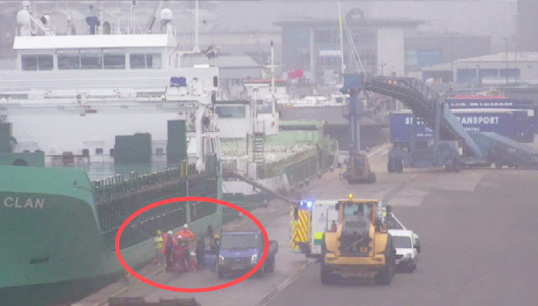Officer's fall from Arklow Clan cargoship brings flag and port state surveys in question
13 December 2022

An investigation into an officer's potentially fatal fall from a general cargoship in the port of Aberdeen has raised concerns over the failure of flag state, port state control and the classification society to spot safety shortcomings.
Ireland's Marine Casualty Investigation Board (MCIB) found that the absence of a safety wire on the walkways of the 2,999gt Arklow Clan – and 15 other ships in the company's fleet – had not been identified during inspections.
'Provision of a safety wire is a logical control measure and its absence appears to have been overlooked across the fleet during numerous surveys,' the MCIB report warns. It describes the failure by the relevant authorities to recognise the risks as 'surprising'.
Arklow Clan’s Polish second officer fell 3.6m from the ship’s walkway to the quay below after losing his footing when lowering the handrails to prepare for loading a cargo of scrap metal on 11 August 2021.
The officer suffered serious injuries to both legs, requiring a long stay in hospital, multiple surgeries and extensive rehabilitation.
The report notes that lowering the handrails was not a routine operation, as they only needed to be put into the hanging position for certain cargoes or port requirements. However, the ship's safety management system did not require a risk assessment and permit to work to be completed before the task.
Although there were four fall prevention harnesses onboard, investigations revealed that it was not the general practice for the crew to use safety harnesses when lowering the handrails.
The report notes that a review of walkway handrails across the Arklow Shipping fleet identified that the walkways of 16 vessels were not fitted with a safety wire – 'meaning continuous fall arrest protection could not be assured when the handrails were lowered'.
A safety wire was retrofitted to each vessel and company standing orders were modified to require the use of full PPE and a safety harness when raising or lowering the handrails.
Although the officer said he felt 'relatively fresh' at the time of the accident and his work and rest hour records showed he was unlikely to have been suffering from excessive fatigue, the MCIB said 'a degree of fatigue' could have been a contributory factor in his momentary loss of concentration.
The report also points out that working at height remains one of the biggest causes of fatalities and major injuries onboard vessels. 'A failure to adequately identify work hazards, poor planning and supervision remain contributory factors in the majority of working at height incidents,' it warns.
The MCIB said its investigation had provided 'persuasive evidence' that the risks associated with the handrail lowering operation had not been appreciated by the crews or the vessel operator and a lack of reported incidents 'may have created a degree of complacency amongst crews' about the dangers. But, it concluded, action taken since the accident and examples of permits to work, 'toolbox talks' and risk assessments covering the handrail operations had shown 'a cultural change led by Arklow Shipping's senior management'.
Tags
More articles
Shift in public's attitude to seafarers picked up in second Maritime Barometer survey
To celebrate the vibrancy of the maritime industry, Nautilus International commissioned a second survey of 2,000 UK residents in July 2022.
Getting smarter on attracting and retaining a diverse maritime workforce
Nautilus officials and members have taken part in a conference which presented the outcomes of a twin-pronged European project aimed both at attracting more women and underrepresented groups into the maritime industry and investing in digital transitions.
P&O Ferries boss officially world's worst employer
P&O Ferries' CEO Peter Hebblethwaite has been named as the Worst Boss in the World at a gathering of nearly 1,000 trade unionists from around the world.
